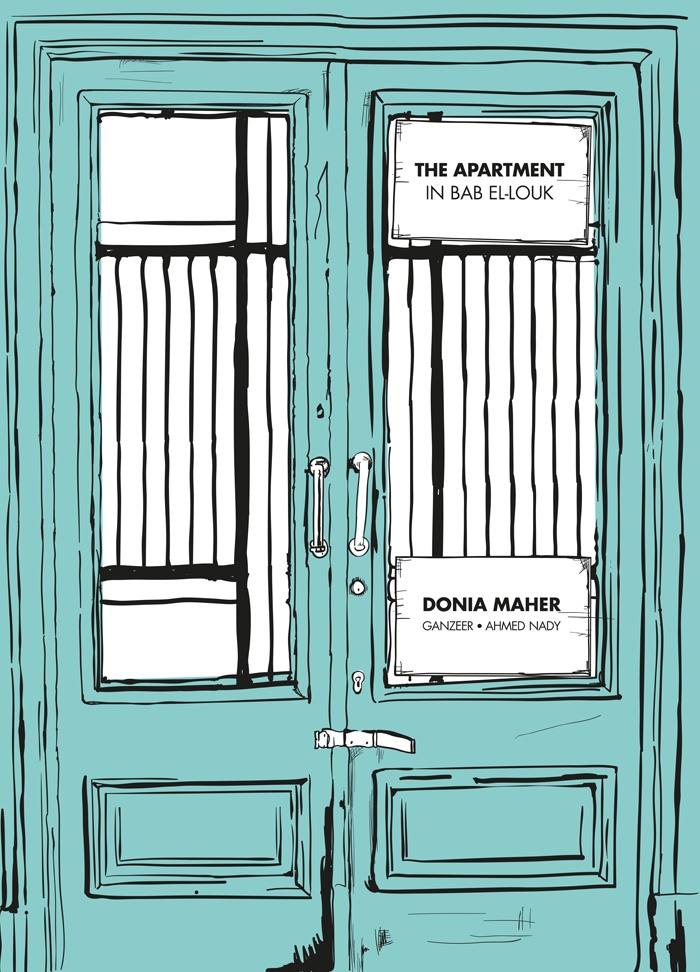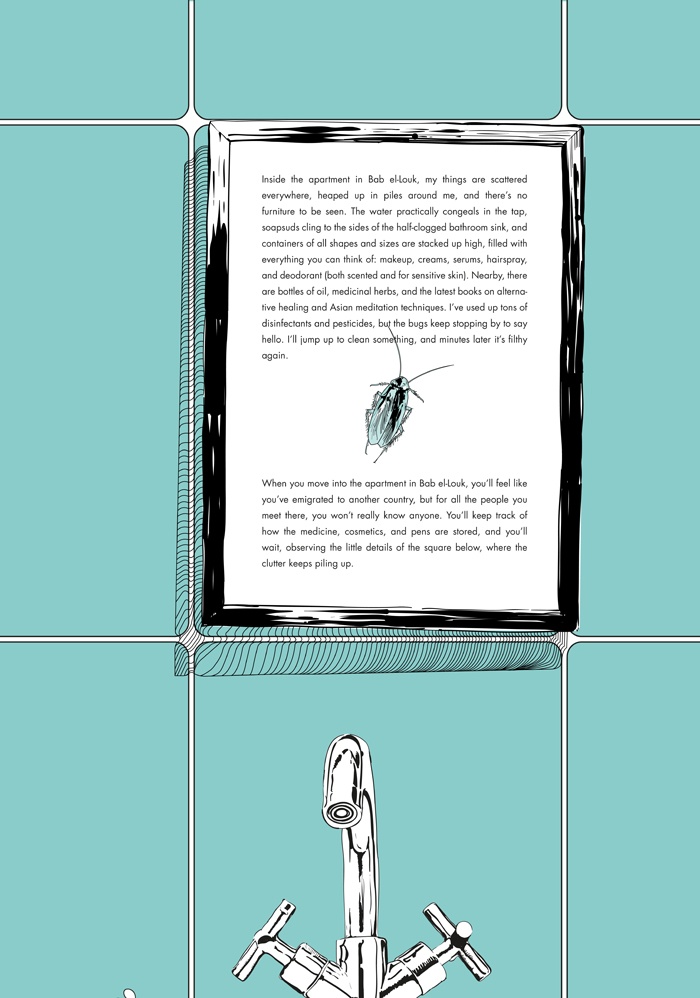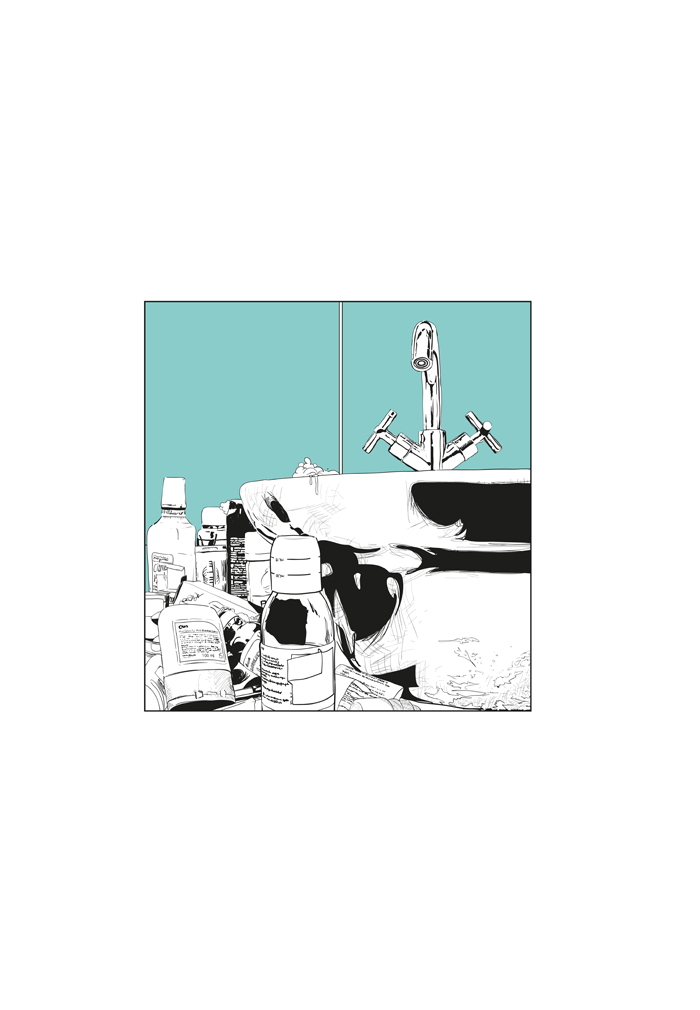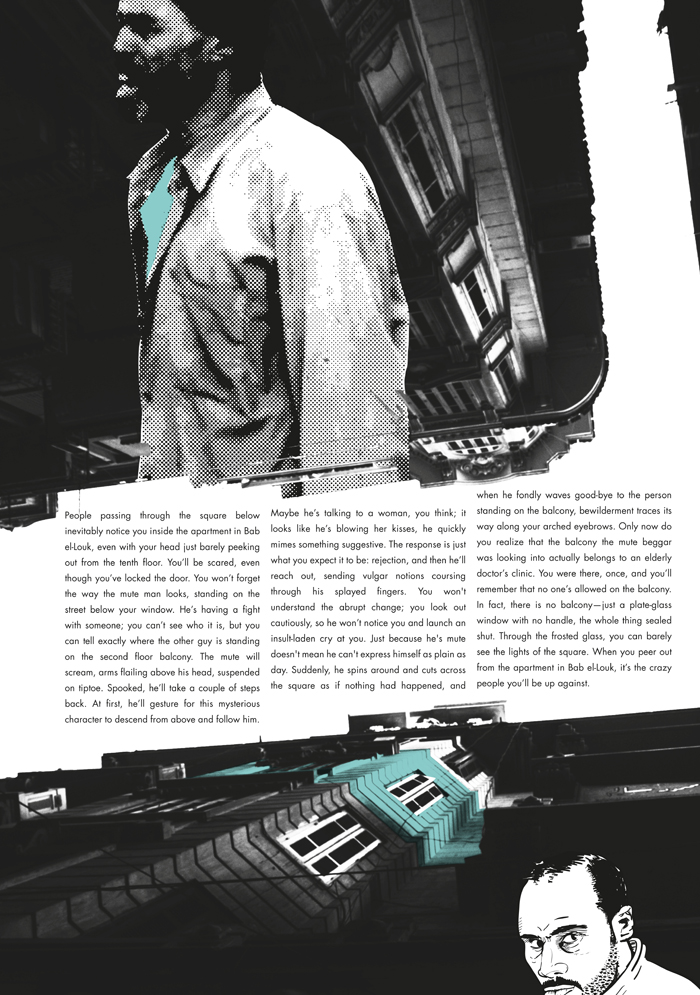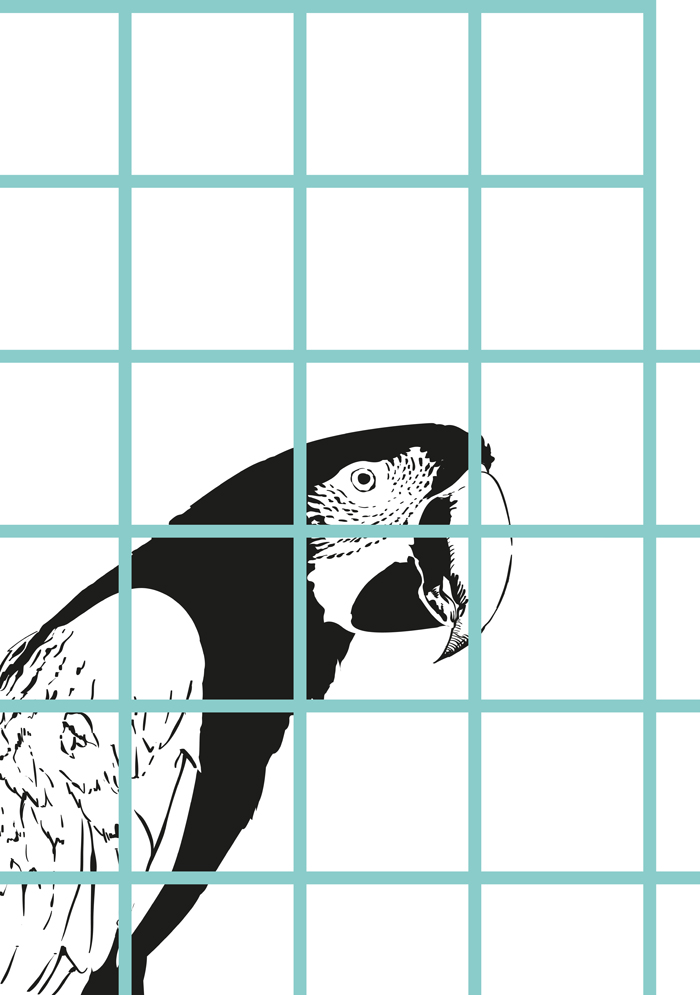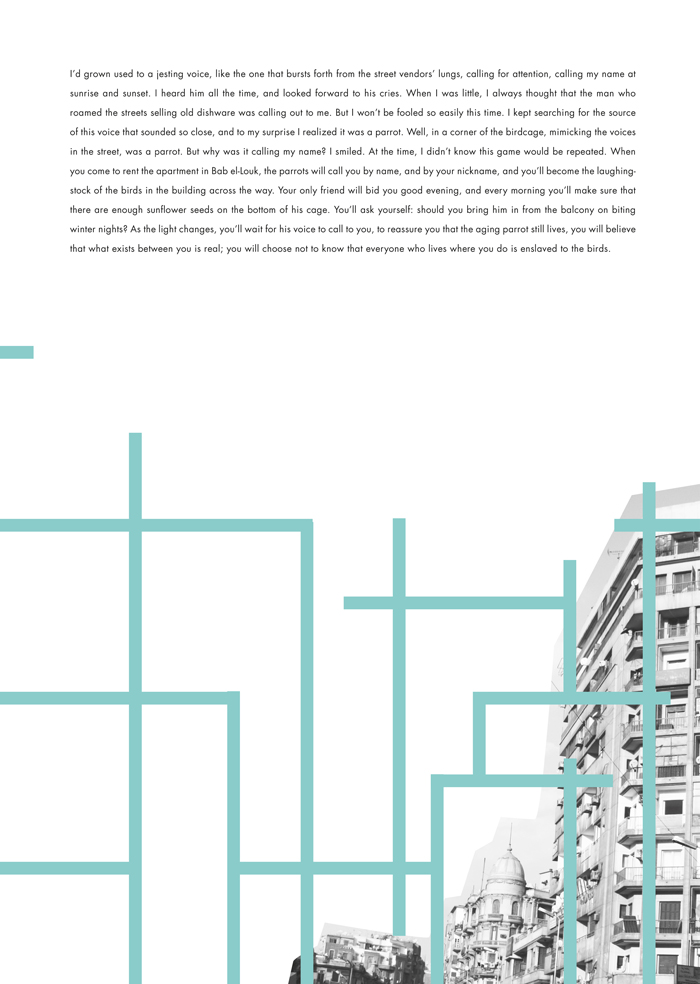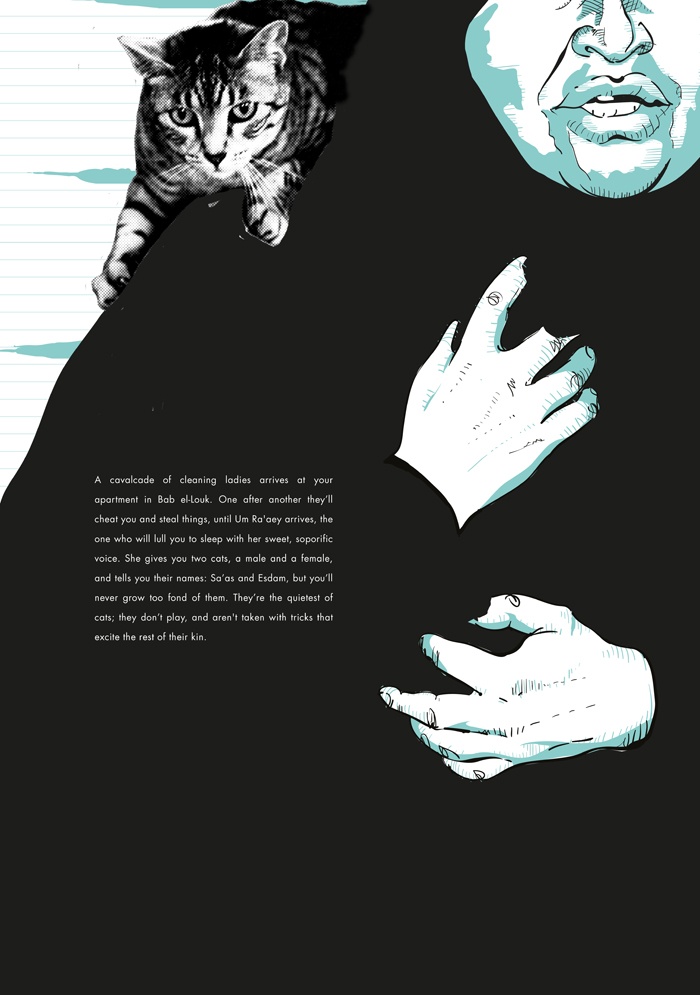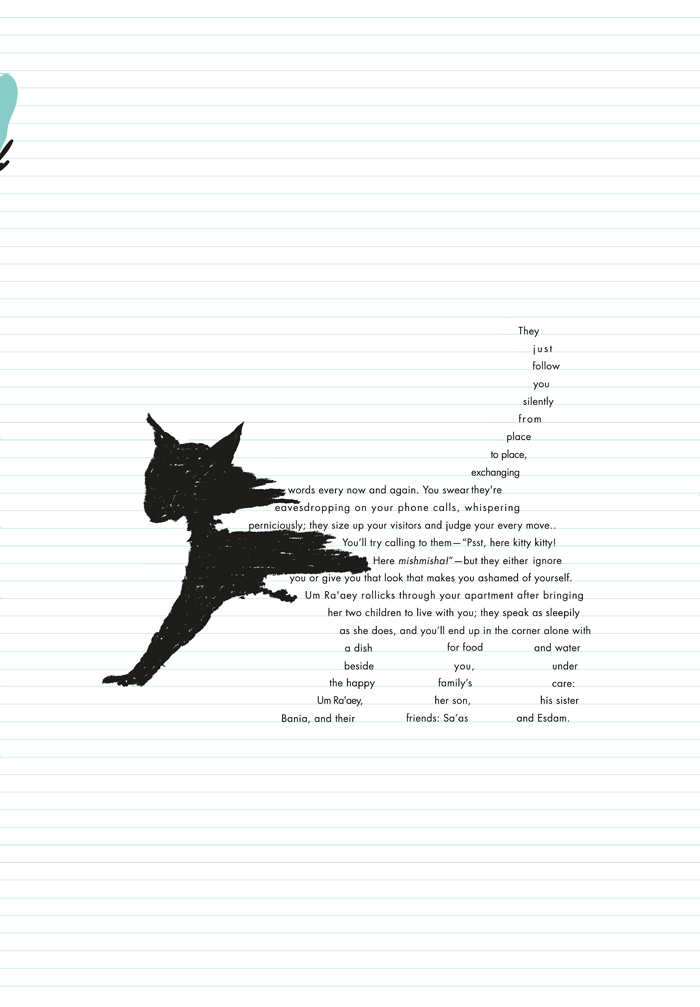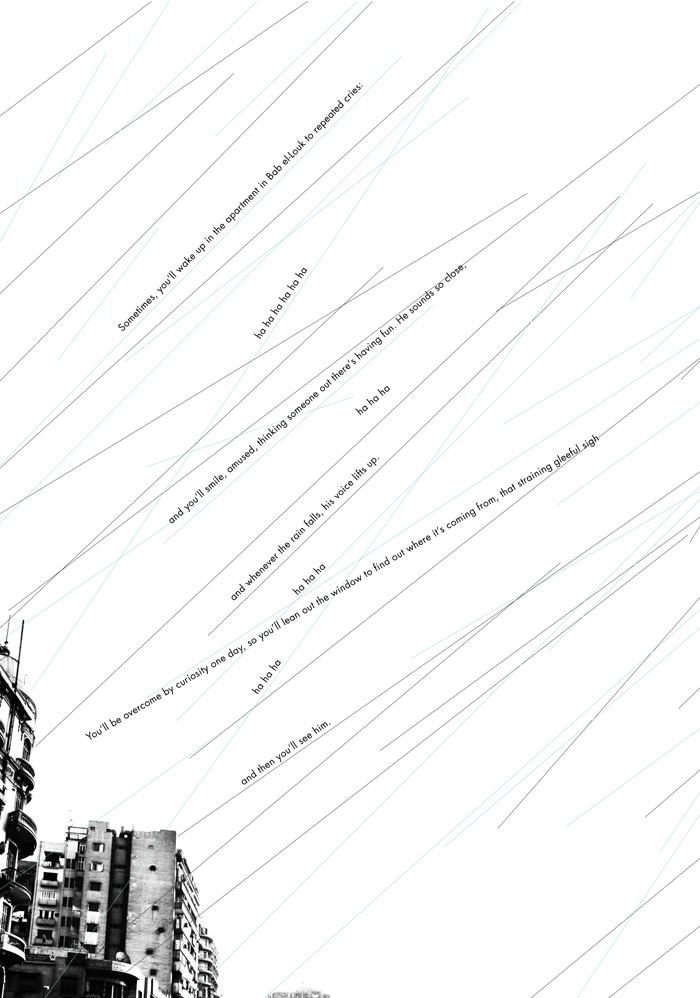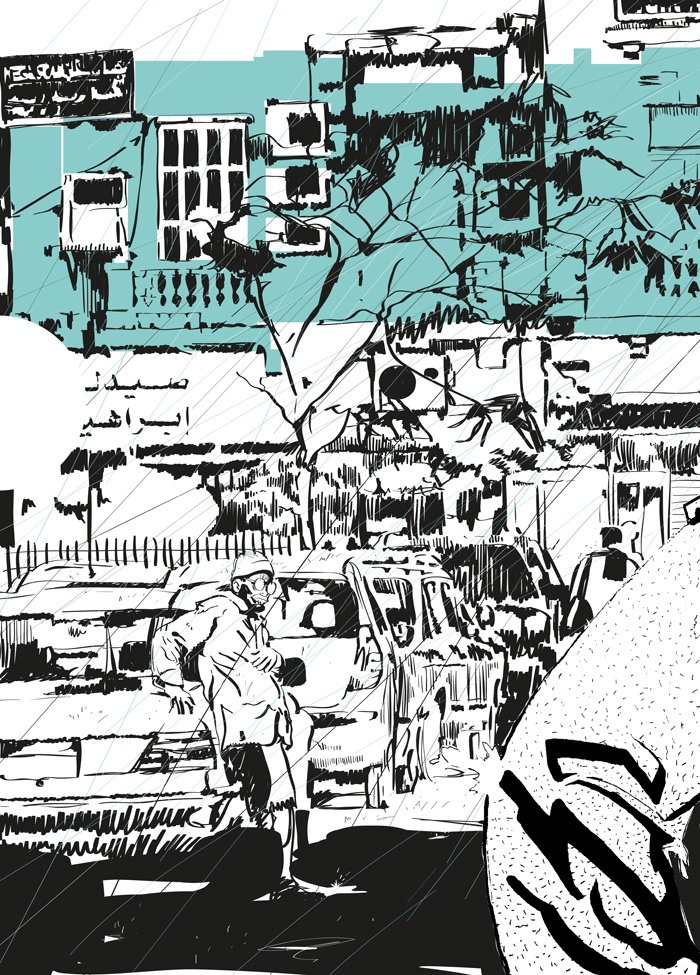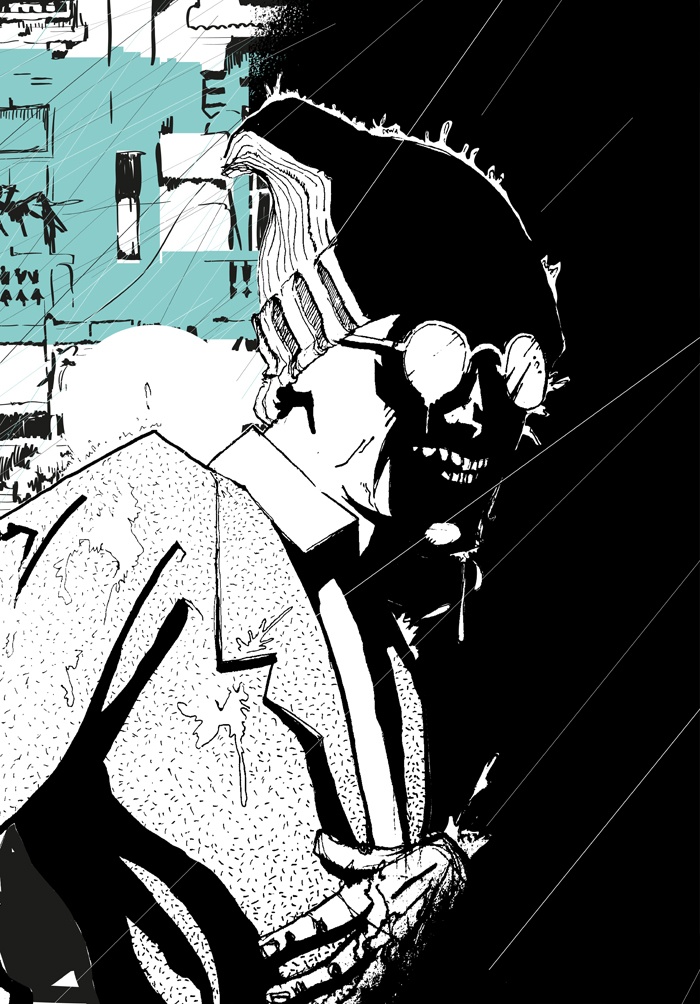Text: [Title Page] The Apartment in Bab El-Louk Donia Maher Ganzeer/Ahmed Nady
Text: Inside the apartment in Bab el-Louk, my things are scattered everywhere, heaped up in piles around me, and there’s no furniture to be seen. The water practically congeals in the tap, soapsuds cling to the sides of the half-clogged bathroom sink, and containers of all shapes and sizes are stacked up high, filled with everything you can think of: makeup, creams, serums, hairspray, and deodorant (both scented and for sensitive skin). Nearby, there are bottles of oil, medicinal herbs, and the latest books on alternative healing and Asian meditation techniques. I’ve used up tons of disinfectants and pesticides, but the bugs keep stopping by to say hello. I’ll jump up to clean something, and minutes later it’s filthy again. When you move into the apartment in Bab el-Louk, you’ll feel like you’ve emigrated to another country, but for all the people you meet there, you won’t really know anyone. You’ll keep track of how the medicine, cosmetics, and pens are stored, and you’ll wait, observing the little details of the square below, where the clutter keeps piling up.
No text
Text: Outside your window, Cairo’s nooks and crannies are lonely and forsaken, like a deserted crime scene. Distant lights reveal themselves to you furtively, never coming too close. You’ll keep your curtains drawn at most hours, holding the sorrowful square at bay. Your suitcases are still packed and ready to go. You’ll feel you’re always being watched, like you’re pressed for time—even in the doldrums of your day off, with nothing to do. As a rule you’ll close the doors when you move from one room to the next, assiduously checking the windows, and there’s that must scent that never leaves your nose.
Text: People passing through the square below inevitably notice you inside the apartment in Bab el-Louk, even with your head just barely peeking out from the tenth floor. You’ll be scared, even though you’ve locked the door. You won’t forget the way the mute man looks, standing on the street below your window. He’s having a fight with someone; you can’t see who it is, but you can tell exactly where the other guy is standing on the second floor balcony. The mute will scream, arms flailing above his head, suspended on tiptoe. Spooked, he’ll take a couple of steps back. At first, he’ll gesture for this mysterious character to descend from above and follow him. Maybe he’s talking to a woman, you think; it looks like he’s blowing her kisses, he quickly mimes something suggestive. The response is just what you expect it to be: rejection, and then he’ll reach out, sending vulgar notions coursing through his splayed fingers. You won’t understand the abrupt change; you look out cautiously, so he won’t notice you and launch an insult-laden cry at you. Just because he’s mute doesn’t mean he can’t express himself as plain as day. Suddenly, he spins around and cuts across the square as if nothing had happened, and when he fondly waves good-bye to the person standing on the balcony, bewilderment traces its way along your arched eyebrows. Only now do you realize that the balcony the mute beggar was looking into actually belongs to an elderly doctor’s clinic. You were there, once, and you’ll remember that no one’s allowed on the balcony. In fact, there is no balcony—just a plate-glass window with no handle, the whole thing sealed shut. Through the frosted glass, you can barely see the lights of the square. When you peer out from the apartment in Bab el-Louk, it’s the crazy people you’ll be up against.
No text.
Text: I’d grown used to a jesting voice, like the one that bursts forth from the street vendors’ lungs, calling for attention, calling my name at sunrise and sunset. I heard him all the time, and looked forward to his cries. When I was little, I always thought that the man who roamed the streets selling old dishware was calling out to me. But I won’t be fooled so easily this time. I kept searching for the source of this voice that sounded so close, and to my surprise I realized it was a parrot. Well, in a corner of the birdcage, mimicking the voices in the street, was a parrot. But why was it calling my name? I smiled. At the time, I didn’t know this game would be repeated. When you come to rent the apartment in Bab el-Louk, the parrots will call you by name, and by your nickname, and you’ll become the laughing-stock of the birds in the building across the way. Your only friend will bid you good evening and every morning you’ll make sure that there are enough sunflower seeds on the bottom of his cage. you’ll ask yourself: should you bring him in from the balcony on biting winter nights? As the light changes, you’ll wait for his voice to call to you, to reassure you that the aging parrot still lives, you will believe that what exists between you is real; you will choose not to know that everyone who lives where you do is enslaved to birds
Text: A cavalcade of cleaning ladies arrives at your apartment in Bab el-Louk. One after another they’ll cheat you and steal things, until Um Ra’aey arrives, the one who will lull you to sleep with her sweet, soporific voice. She gives you two cats, a male and a female, and tells you their names: Sa’as and Esdam, but you’ll never grow too fond of them. They’re the quietest of cats; they don’t play, and aren’t taken with tricks that excite the rest of their kin.
Text: They just follow you silently from place to place, exchanging words every now and again. you swear they’re eavesdropping on your phone calls, whispering perniciously; they size up your visitors and judge your every move.. You’ll try calling to them—“Psst, here kitty kitty! Here mishmisha!”—but they either ignore you or give you that look that makes you ashamed of yourself. Um Ra’aey rollicks through your apartment after bringing her two children to live with you; they speak as sleepily as she does, and you’ll end up in the corner alone with a dish for food and water beside you, under the happy family’s care: Um Ra’aey, her son, her sister Bania, and their friends: Sa’as and Esdam.
Text: Sometimes, you’ll wake up in the apartment in Bab el-Louk to repeated cries: ha ha ha ha ha ha and you’ll smile, amused, thinking someone out there’s having fun. He sounds so close, ha ha ha and whenever the rain falls, his voice lifts up. ha ha ha You’ll be overcome by curiosity one day, so you’ll lean out the window to find out where it’s coming from, that straining gleeful sigh ha ha ha and then you’ll see him.
Text: On the other side of the square, he skips around the sidewalk to a hastening accelerando each leap launching him several meters in different direction, his cries magnify, gradually, overtaking the first sounds of morning in the sodden square. He lifts his face and shoulders to the heavens, where the muse for his joyful dance fours forth: the rain. If it rains at night you won’t be able to see him, but you can still hear his laughter ha ha ha echoing in the buildings around the square; in the night rain, he comes out to dance in a sport far from el-Ayyat Farms’ shop, where he dances to the morning rain.
No text.
No text.







